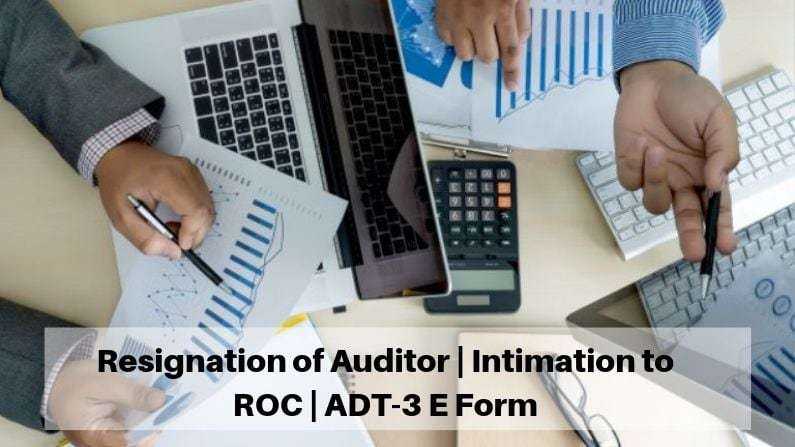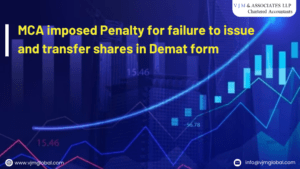Registrar of Companies (“RoC”) is the public body which maintains all information about the companies. Information about resignation of Auditor is one of the crucial information as Auditor is an independent qualified professional who reports about correctness of financial statements of the company to its stakeholders.
Therefore, Companies Act, 2013 (“The Act”) contains various provisions that require the company to file intimation with RoC related to auditor. Following forms are required to be file by the company about auditor:
- ADT-1: Information to the Registrar by Company for appointment of Auditor
- ADT-2: Application for removal of auditor(s) from his/their office before expiry of term
- ADT-3: Notice of Resignation by the Auditor
Thereby, RoC maintains all information related to auditor. In this article we are going to discuss provisions related to resignation of auditor and filing of its corresponding intimation with RoC.
1. Provisions related to resignation by Auditor (Section 140(2) of the Act)
Section 140(2) of Companies Act, 2013, deals with resignation of auditor and its related compliance. As per provisions, if any auditor resigns from the company then he shall file an intimation about its resignation with RoC and with the company within 30 days from the date of resignation. Further, in case of Government Company, the auditor shall also file such intimation with the Comptroller and Auditor-General of India.
In purview of Section 140(2) of the Act, Rule 8 of The Companies (Audit and Auditors) Rules, 2014 requires auditor to file intimation about its resignation with RoC in form ADT-3.
This article contains detailed information about ADT-3 in FAQs form as follows:
2. Frequently Asked Questions (FAQ)
2.1 What is e-Form ADT-3?
ADT-3 is an intimation form required to be filed by auditor for intimating RoC about his resignation from the company as auditor.
2.2 Who is required to file ADT-3?
Auditor who resigns from his office of auditor of the company is required to file form ADT-3 within 30 days from the date of his resignation. Please note that responsibility to file ADT-3 lies with auditor not the company.
2.3 Should an auditor of private limited company also file ADT-3?
ADT-3 should be filed by every auditor at the time of resignation irrespective of the nature of the company as public company or a Private Limited Company or government company.
2.4 What is the due date to file this form?
ADT-3 form is required to be file within 30 days from the date of resignation of auditor.
2.5 What is legal fee for filing ADT-3 form?
Amount of legal fee to be paid alongwith ADT-3 is based on share capital. Following is fee structure based on share capital:
| Share capital | Fee Applicable |
| Less than INR 1,00,000 | INR 200 per document |
| 1,00,000 to 4,99,999 | INR 300 per document |
| 5,00,000 to 24,99,999 | INR 400 per document |
| 25,00,000 to 99,99,999 | INR 500 per document |
| I,00,00,000 and above | INR 600 per document |
However, in case of company without share capital, fee applicable is INR 200 and in case of foreign company, applicable fee is INR 6,000
2.6 What are consequences of non-filing of ADT-3 within stipulated time?
Provisions relating to penal consequences for delay in filing of ADT-3 are given under Section 140(3) of companies act, 2013.
As per section 140(3) (amended on 12.01.2019), if auditor fails to file ADT-3 within stipulated time then he will be liable to pay penalty of INR 50,000 or amount equal to his remuneration, whichever is less.
In case of continuing failure, additional penalty of INR 500 for each day during which defaults continues will be applicable. Such penalty will not exceed INR 5,00,000.
2.7 What all documents are required to attach while filing form ADT-3?
While filing ADT-3, it is mandatory to attach resignation letter. However, auditor may make any other optional attachment also.
2.8 What information is required to be furnish in form ADT-3?
Form ADT-3 contains following information:
- Corporate Identification Number (“CIN”)
- Category of Auditor (Individual or Firm)
- Income Tax PAN of auditor/Auditor’s firm
- Name of Auditor/Auditor’s firm
- Membership number of auditor/Auditor’s firm
- Address of Auditor/Auditor’s firm
- Date of appointment as auditor
- Date of resignation of auditor
- Reasons for resignation and any other facts relevant to the resignation.
2.9 Are provisions in case of removal of auditor by company similar to suo-moto resignation of auditor?
Provisions related to removal of auditor by company are given u/s 140(1) of the act. As per section 140(1) of the act, for the purpose of removal of auditor before expiry of his tenure, company is required to pass special resolution alongwith prior approval of Central Government.
Application for removal of auditor shall be filed in form ADT-2 by the company.
Read more about Compliance for companies registered under ROC






